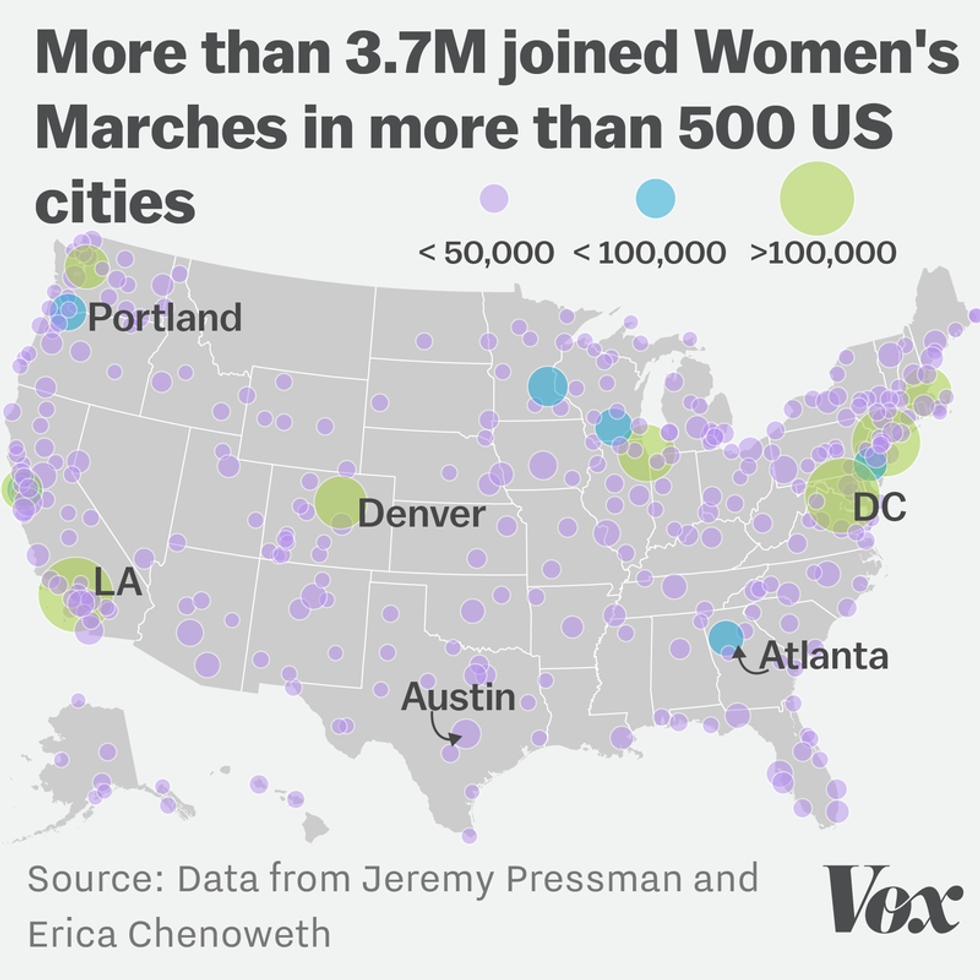This weekend, millions of women gathered worldwide to protest the inauguration of Donald Trump. What started as a march through Washington, D.C. quickly grew and became protests in major cities around the United States, such as Chicago, New York, Boston, L.A. Nationwide, over 3.7 million attended the march.
While many speakers in D.C. demanded more inclusion of women of color, transgender women, and disabled women, there were signs among protestors carrying signs that didn't quite follow this message. Some signs said things such as "Pussy = power," equating womanhood with a vagina, isolating many of the trans women participating in the march.
The march was a celebration of womanhood in whatever form it may take and a large takeaway is that for many, intersectional feminism has a long way to go. This takes conscious effort and can't happen overnight but the women's march gave many examples of what protestors and activists can do, and what to be aware of. The organization itself presented an inclusive and welcoming environment for all who wanted to participate.
Janelle Monae wrote and performed a song about the abuse of power by policemen, calling to attention the number of innocent people killed by police officers. She had the Mothers of the Movement participate--Sybrina Fulton, the mother of Trayvon Martin, Gwen Carr, the mother of Eric Garner, Maria Hamilton, the mother of Dontreé Hamilton, Lucy McBath, the mother of Jordan Davis, and Hawa Bah, the mother of Mohamed Bah.
Angela Davis, famous political activist and author, said, "we the hundreds of thousands, the millions of women, trans-people, men and youth who are here at the Women's March, we represent the powerful forces of change that are determined to prevent the dying cultures of racism, hetero-patriarchy from rising again." Davis's urge to continue to preserve who we are, and most importantly, the cultures of those who are being consistently demanded to change, is what we should be mindful of moving forward.

This isn't the part where you try to defend yourself and say you didn't vote for Trump. This is the part where, if you're white, you consider that feminism extends beyond the experiences of a white woman. It involves the experiences of indigenous women, black women, Muslim women, disabled women--the women that this country works hard to ignore.
The march was set up to be not Anti-Trump but Pro-Women, and on stage, we saw that dream come to life. Women brought up issues like reproductive rights, educational rights, LGBTQIA rights, the water crises in not only Flint, Michigan, but at Standing Rock. Diverse women brought up issues that were relevant to their experiences, and when listened to properly, this could have been eye opening. Instead, people of color expressed discomfort in the crowd.
One indigenous woman explained that within the prayer circle she was apart of, she felt powerful and comfortable. However, outside of the circle, she did not feel that same level of respect ("they" and "WW" both refer to white women at the march).

Huffington Post (co-founded by a woman, with a woman editor!) came out with an article with suggestions on how to be an intersectional feminist. The fight for equality can't just stop in one place. If you truly want equality, that means it must be equality for everyone.


























